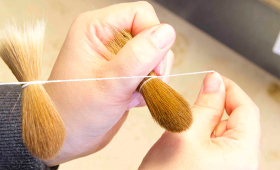From witches’ brooms to fine brushes
“Broom and brush maker” training regulation updated
25/2017 | Bonn, 14.07.2017

Whether it's in day-to-day life or in the world of art, for painting the apartment or for personal grooming—brooms and brushes are needed everywhere. There are approximately 1000 different types, from huge brooms for fairy-tale witches to vegetable brushes, from fan-shaped make-up brushes to the finest artists’ brushes, or large paint brushes. It is the high-quality product used in the craft trades which is produced in particular by the broom and brush makers. On behalf of the Federal Government, and together with social partners and experts from company practice, the Federal Institute for Vocational Education and Training (BIBB) has now brought this vocational training up to date. The new training regulations will enter into force on 1 August.
Technical, commercial and organisational changes and developments in broom and brush manufacturing form the background to this update. For example, the updated training regulation takes into account new manufacturing processes and enhanced product requirements in relation to safety and sustainability. Not only should they be good to handle and hard-wearing, but in some circumstances they also have to meet the most demanding of requirements, particularly in relation to artists’ needs.
They are produced from animal hair, natural bristles, plant-based or synthetic fibres which are inserted into wood or plastic. The vast majority of broom and brush production actually comes from German industrial companies or is imported. However, there are also consumers who are particularly interested in products produced in the craft trades—for which, in turn, a higher price is then paid.
Training as a broom and brush maker is offered both by skilled craft businesses as well as by industrial companies. Trainees learn about the different types of brooms and brushes and how they are used, they are taught about the different manual and industrial processing techniques, and made familiar with the machines and tools. The new training regulations no longer differentiate according to specialism. They instead specify broom and brush manufacturing as the separate key area in each case.
The employment prospects for trainees are very good. Following the final examination, a further qualification as master craftsman in broom and brush making can then be taken.
As of 1 August, the updated training regulation and the framework curriculum aligned with this, which has been developed by the Standing Conference of the Ministers of Education and Cultural Affairs for the school-based section of the dual vocational education and training, replaces the existing regulation from 1984.
Further information is available on the BIBB website at www.bibb.de/neue-berufe
Image material is available at www.bibb.de/pressefotos.
Contact partner:
Brigitte Seyfried
Specimen copy requested if printed.